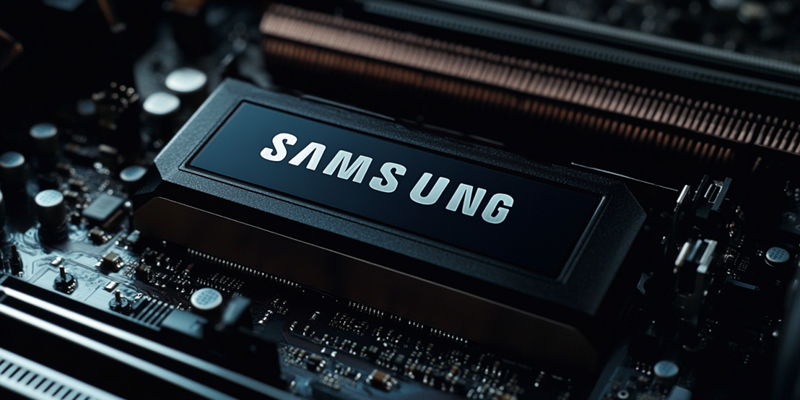Samsung Foundry has made headlines by securing Ambarella, a US-based semiconductor design firm, as a client for its upcoming 2nm semiconductor process. This significant achievement comes as Samsung navigates a challenging environment, especially with yield rate issues associated with its advanced 3nm GAA (Gate-All-Around) process. Despite these hurdles, the deal with Ambarella represents a noteworthy milestone for Samsung as it aims to establish itself as a key player in the high-end semiconductor market.
Samsung’s Strategic Moves in the Semiconductor Industry
Partnership with Ambarella
Ambarella, known for its expertise in video compression and image processing solutions, particularly for AI-driven automotive and surveillance applications, has become one of the first companies to commit to Samsung’s 2nm process. This partnership underscores Samsung’s growing influence in the semiconductor sector, despite the firm not being as globally prominent as other major AI companies. Securing Ambarella is a valuable win for Samsung, signifying its progress in attracting high-profile clients to its advanced technology offerings.
Samsung’s plan to commence commercial production of its 2nm chips by 2026 or 2027 highlights its ambitious roadmap. However, the company is still grappling with yield rate issues, necessitating continuous investment in improving production facilities. Collaborations with clients like Ambarella are essential for these improvements. While the market’s enthusiasm is cautiously optimistic, Samsung remains focused on refining its output and processes to meet industry standards. This proactive approach is crucial for the company’s long-term success and competitiveness.
Addressing Yield Rate Challenges
Yield rates remain a significant challenge for Samsung, particularly with its 3nm GAA process. These difficulties have necessitated a broader strategy focused on enhancing efficiency and streamlining operations. Even as Samsung celebrates its partnership with Ambarella, the company must continue to invest heavily in addressing these technical issues to maintain its competitive edge. This involves not just technological advancements but also strategic collaborations and industry partnerships.
The broader semiconductor landscape shows that Samsung has lined up mainstream customers like Qualcomm and NVIDIA for its future high-end processes. This lineup indicates a strong market confidence in Samsung’s potential, even as it faces ongoing technical challenges. By securing such clients, Samsung demonstrates its commitment to overcoming production hurdles and achieving technological breakthroughs. These strategic moves underscore the company’s determination to gain a foothold in the highly competitive semiconductor market.
Broader Context and Strategic Initiatives
Market Confidence in Samsung
Samsung’s success in securing clients like Ambarella, Qualcomm, and NVIDIA reflects broader market confidence in its technology and production capabilities. These partnerships are particularly noteworthy given the company’s ongoing challenges with yield rates and other technical issues. By attracting such prominent clients, Samsung signals its readiness to compete with industry giants and solidify its position in the high-end semiconductor market.
The company’s proactive steps to improve its 3nm GAA chip yields and recent staff cuts illustrate its broader strategy to enhance efficiency and streamline operations. These measures are essential for Samsung to maintain its competitiveness amidst intense industry pressures. Moreover, they reflect the company’s broader commitment to achieving stable and higher yield rates, which are crucial for its long-term success in the semiconductor sector. This strategic focus on continuous improvement and efficiency underscores Samsung’s dedication to innovation and technological excellence.
A Nuanced Narrative of Progress
Samsung Foundry has made waves by securing Ambarella, a US-based semiconductor design firm, as a client for its upcoming 2nm semiconductor process. This achievement is noteworthy, considering Samsung’s struggles with yield rate issues in its advanced 3nm Gate-All-Around (GAA) process. Despite these challenges, the deal with Ambarella marks a significant milestone for Samsung in its quest to dominate the high-end semiconductor market.
Ambarella, known for its expertise in AI vision processors for various applications, sees potential in Samsung’s cutting-edge technology. This collaboration could offer Ambarella the edge it needs to advance next-generation AI solutions. For Samsung, sealing this deal is part of a broader strategy to compete with industry giants like TSMC and Intel.
Moreover, the partnership underscores the growing importance of innovation and collaboration in the semiconductor industry. As technology advances, companies must push the boundaries to stay competitive. By aligning with Ambarella, Samsung is not only addressing current challenges but positioning itself strong for future technological breakthroughs.

